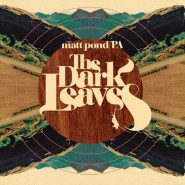 Matt Pond PA
Matt Pond PAThe Dark Leaves
Score: 59
Matt Pond PA released its newest album last Tuesday. At this point, the band has already accumulated a respectable number of LPs, along with a slew of EPs - and former band members. The album, The Dark Leaves, has its moments, but is clearly weighed down by an ununified approach, reasonable for a band that has changed members so many times, but uncommon among bands’ 8th albums.
The largest issue for mpPA on The Dark Leaves is the band’s inability to agree on what songs should sound like. Half of the band insists on constant, flowing sound, while the other half plays only truncated and forceful repeated notes. This style conflict then consumes both the vocals and the album as a whole. Matt Pond, even when clearly straining, can never seem to sing loud enough over the instrumental dichotomy, and the album ends up sounding like one long, long conflict, truly interrupted only once or twice.
In all fairness, those interruption do prove to be quite worthwhile. On “Remains,” the band manages to come together to create waves of beautiful crescendos somehow only accentuated by the staunch drumbeats. These tracks also serve to show that, whether or not they can agree with each other, the band members are still pretty talented musicians. While not terribly complicated, the drum fills near the end of “Remains” are perfectly placed and balanced. Similarly, “Sparrows,” which plays significantly more with melodies in instrumental sections than other tracks, best exemplifies the excellent, though always subtle use of keyboards.
As for Matt Pond himself, the album’s breathy, sometimes slurred vocals maintain a remarkably rich sound that does what it can to permeate the thick fog of instrumentals. But every good quality maintained by the vocals seems to be negated by something less desirable. While the vocals maintain a strong tone, they are certainly not unique to any stretch of the imagination. And though they mostly try and fit with the flowing half of the rest of the music, Pond sometimes ends up sounding strained, which, though understandable, given how little room the rest of the sound gives him, is nevertheless undesirable. As for what Matt Pond is actually singing, the lyrics are about as inoffensive as possible. Neither important nor noticeable, the long-winded love-related stories can easily be ignored, have no truly exceptional lines, and seem to have no effect whatsoever on the overall sound of the album.
In fact, the most impressive aspect of The Dark Leaves is that, even through all of its conflict and mediocrity, it’s not a bad album. In fact, it’s pretty easy to see The Dark Leaves as decent radio or background music. While any concept that might have initially fueled the album was quickly submerged - even the minor section introducing “The Dark Leaves Theme” is rapidly replaced with an entirely more upbeat track - The Dark Leaves fares pretty well without any sort of driving force.
This post is tagged 50-59, Matt Pond PA